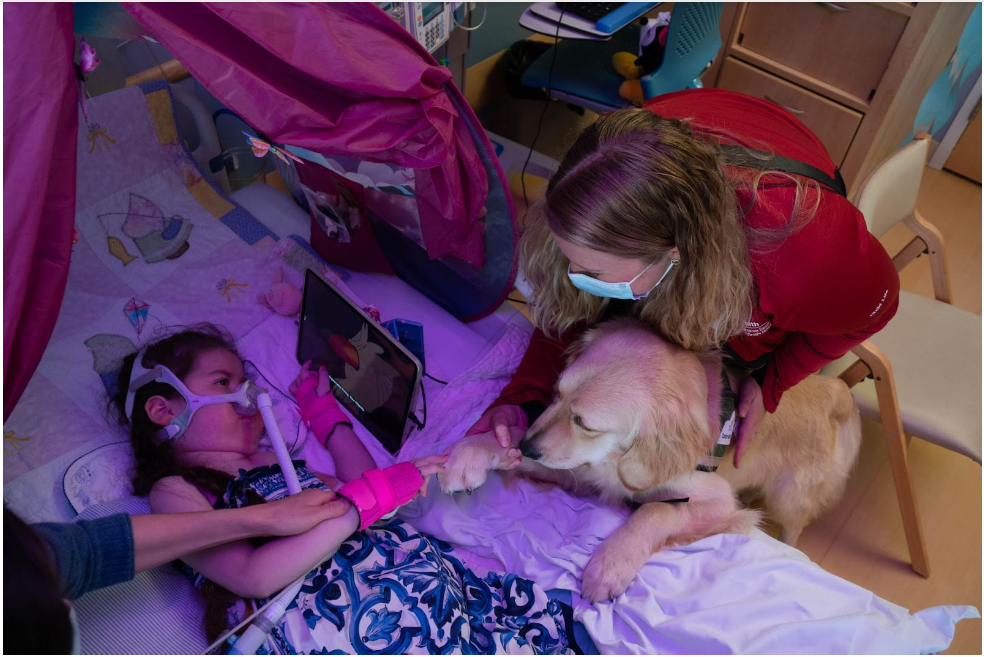Recent studies show that facility and therapy dog hospital programs are becoming more and more common as hospitals recover from COVID-19. But how exactly do the four-legged friends improve patient outcomes?
American Family Children’s Hospital began the Canine Health and Medical Pals program, also known as CHAMPs, in 2021. The aim of the program is to utilize facility dogs to help support sick children during their treatment.
Multiple research studies show that dogs help reduce stress. Interacting with dogs lowers cortisol levels, increases oxytocin levels and lowers blood pressure, according to the National Institute of Health. To harness these stress-reduction benefits for patients, an increasing number of hospitals are implementing facility dog programs, such as the CHAMPs program.
UW researchers earn NSF grant to create inclusive health communication strategies
The hospital worked with a non-profit group called Canine Assistants to launch the program, which matches hospitals with facility dogs. American Family Children’s Hospital has two facility dogs, Kiko and Cola, who work with child life specialists, according to UW Health. Cola’s handler and child life specialist Katie Markowski said she likes to watch the budding relationships between the dogs and kids.
“It’s really cool to see how Cola interacts with kids he’s seen multiple times and how they build relationships with him too,” Markowski said. “I’m finding that kids build relationships much faster with Cola than they do with adults.”
Just like full-time employees of the hospital, facility dogs work 40-hour weeks to provide customized interventions and coping plans for pediatric patients. According to the nonprofit Educated Canine Assisting with Disabilities, facility dog duties include distracting patients during procedures and providing comfort during treatments. Facility dogs also help motivate patients to reach treatment goals, like walking, taking medicine or eating. Patients will pet, play or talk with the dog to help relax, and facility dogs will even lay on the bed with patients to provide a calming presence.
Building relationships with Cola helps patients feel more comfortable in the hospital room and less isolated. With teenagers in particular, Markowski said she has found having the calming, familiar presence of a dog in the room can help encourage teens to open up and share their stories.
The Lab Report: Using social psychology to create equity in classrooms
Markowski said a big role facility dogs play is normalizing patient experience and bringing a sense of comfort in an unfamiliar environment.
“Many kids have dogs as pets at home or other animals as pets, so Cola can bring some normalcy to a hospital room,” Markowski said.
Studies have shown facility dogs reduce anxiety in pediatric patients and decrease distress in children undergoing physical exams. The mental health benefits facility dogs provide, such as lowering stress levels, improve patient care by allowing medical procedures to go more smoothly.
Dogs on Call is a non-profit therapy animal organization based in Wisconsin. Dogs on Call hospital coordinator, Karen Peckman said she witnessed some of the tangible health benefits of facility dog intervention when visiting hospitals with her therapy dog, Pete.
Peckman has been involved with Dogs on Call since 2008 and primarily visits hospitals, mental health facilities and correctional facilities. Peckman said she’s seen a patient’s blood pressure lower on the monitor as the therapy dog visit continued, showing a concrete way dogs can support a patient’s health.
Training for therapy dogs is less rigorous than that of facility dogs but includes successfully completing 21 scenarios that may be encountered on a hospital visit, and the handler and dog are re-tested every two years, Peckman said. Therapy dogs typically work for a few hours a week at different sites, while facility dogs work full-time at the same location.
Additionally, Peckman said medical staff recognize how dogs play a role in the long-term mental health and attitude changes of patients.
Hobby to science: How tracking seasons blossomed into climate science
“We’ve had nurses write emails to say they hadn’t seen that patient smile before, or it’s made such a difference in their patient or the patient’s attitude changed completely after your visit,” Peckman said. “And we can only attribute it to the therapy dog visit.”
While facility dogs clearly provide health benefits for patients, there is also a risk when bringing them into a strictly controlled environment, according to a study by the Department of Health and Human Services. For example, there have been instances in which dogs have brought MRSA into hospital environments because they were not fully sanitized.
To combat these hygiene concerns, Peckman said there are strict sanitation requirements for dogs upon entering the hospitals. Dogs get a full bath within 24 hours of a visit, their teeth are brushed and their nails are cleaned and trimmed. For each patient they visit, and for every interaction with a staff member, the individual and handler must use hand sanitizer before and after petting the dogs. These precautions help hospitals keep vulnerable populations safe, Peckman said.
Peckman and Markowski said the dogs support the mental health of medical staff just as much as the patients.
“Our dogs have a very calming influence and can help in stressful situations for not only kids and families but for staff too,” Markowski said.





















